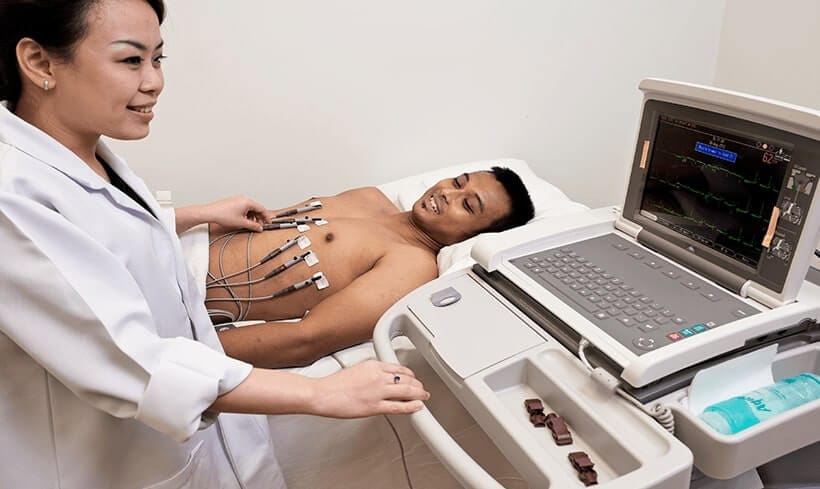ECG Services

At Chest Clinic of Kathmandu and Allergy Center, we are committed to providing comprehensive care for our patients, which includes advanced diagnostic services like electrocardiograms (ECG or EKG). ECGs are critical tools used to monitor heart health and detect any abnormalities in heart function, helping us ensure that our patients receive the best possible care for both respiratory and cardiac conditions. In this blog, we’ll take a closer look at what ECG services involve, their importance, and when they may be necessary.
What is an ECG?
An electrocardiogram (ECG or EKG) is a non-invasive test that records the electrical activity of your heart. Your heart generates electrical impulses that help it beat regularly and pump blood throughout your body. An ECG measures these impulses and creates a visual graph that shows how your heart is functioning. It’s a simple and painless procedure that provides valuable insights into the health of your heart.
How is an ECG Performed?
During an ECG test, several small, adhesive electrodes are placed on your chest, arms, and legs. These electrodes are connected to an ECG machine that records the electrical signals as your heart beats. The test usually takes about 5-10 minutes, and you can lie down comfortably throughout the process. There is no need for any special preparation before the test, and the results are available immediately after.
An ECG records several important metrics, including:
- Heart Rate: The number of beats per minute.
- Heart Rhythm: The pattern of the heart’s electrical impulses, which shows whether your heart is beating in a regular or irregular rhythm.
- Electrical Activity: This refers to the strength and timing of the electrical signals that control your heart’s contractions.
- Cardiac Abnormalities: ECGs can detect abnormal heart rhythms (arrhythmias), signs of a previous heart attack, issues with the heart’s chambers, and other potential heart conditions.
Why ECG Services Are Important
ECG services are an essential part of diagnosing and managing various heart-related conditions. While our clinic specializes in chest and allergy care, heart health is closely related to respiratory health, and an ECG can provide crucial information about how your heart is functioning. Here are some of the key reasons why ECGs are important:
Detection of Heart Problems: ECGs can identify heart-related conditions, such as arrhythmias, heart attacks, and heart failure. This information is crucial for early intervention and treatment, which can significantly improve patient outcomes.
Monitoring Respiratory-Cardiac Connections: Many respiratory conditions, such as chronic obstructive pulmonary disease (COPD) and severe asthma, can put added strain on the heart. An ECG helps monitor heart function in patients who suffer from chronic respiratory illnesses to ensure that the heart is not being adversely affected.
Prevention and Early Intervention: Regular ECGs can help identify risk factors for heart disease, enabling early intervention. This is particularly important for patients with a family history of heart problems or those who have symptoms such as chest pain, shortness of breath, dizziness, or palpitations.
Post-Treatment Monitoring: After treatment for conditions such as a heart attack or other heart issues, ECGs are essential for monitoring recovery and ensuring that the heart is functioning normally. They help in evaluating the effectiveness of medications or other interventions and adjusting treatment plans as needed.
When Should You Consider Getting an ECG?
You may be advised to get an ECG if you experience any of the following symptoms:
- Chest pain or discomfort
- Shortness of breath
- Dizziness or light-headedness
- Heart palpitations or rapid heartbeat
- Unexplained fatigue
- History of heart disease or a family history of heart-related conditions
Additionally, if you have a known respiratory condition that puts additional strain on your heart, such as asthma or COPD, an ECG may be recommended to regularly monitor your heart health. It’s also common for individuals over the age of 50, or those with risk factors like high blood pressure or diabetes, to have periodic ECGs as part of their overall health check-up.
ECGs for Pediatric and Adult Patients
At Chest Clinic of Kathmandu and Allergy Center, we provide ECG services for both pediatric and adult patients. Heart health is important at every stage of life, and we take care to ensure that our youngest patients feel comfortable during the test. Pediatric ECGs are often recommended for children with a family history of heart disease, those with respiratory issues, or when abnormal heart sounds are detected during a physical exam.
For adults, ECGs are essential for the diagnosis and monitoring of heart disease, especially for individuals with chronic respiratory conditions, high cholesterol, or high blood pressure.
Schedule Your ECG Today
If you’re experiencing any symptoms that could indicate a heart or respiratory issue, or if you’re due for a routine check-up, don’t wait to schedule an ECG. Early detection of heart problems can be life-saving, and regular monitoring can help you stay on top of your heart health. At Chest Clinic of Kathmandu and Allergy Center, our ECG services provide fast, accurate results that form the foundation of a personalized treatment plan designed for your long-term well-being.
Contact us today to schedule your ECG and take a proactive step toward maintaining both your heart and respiratory health.
Other Services
Why Choose Us?
- Experienced Specialists
- Modern And Advance Technology
- Comprehensive Respiratory Care
- Convenient In-House Services
- Personalized Treatment Plans
- Preventive Care Focus
- Timely Appointments and Care
- Comfortable and Supportive Environment
- Commitment to Patient Satisfaction
